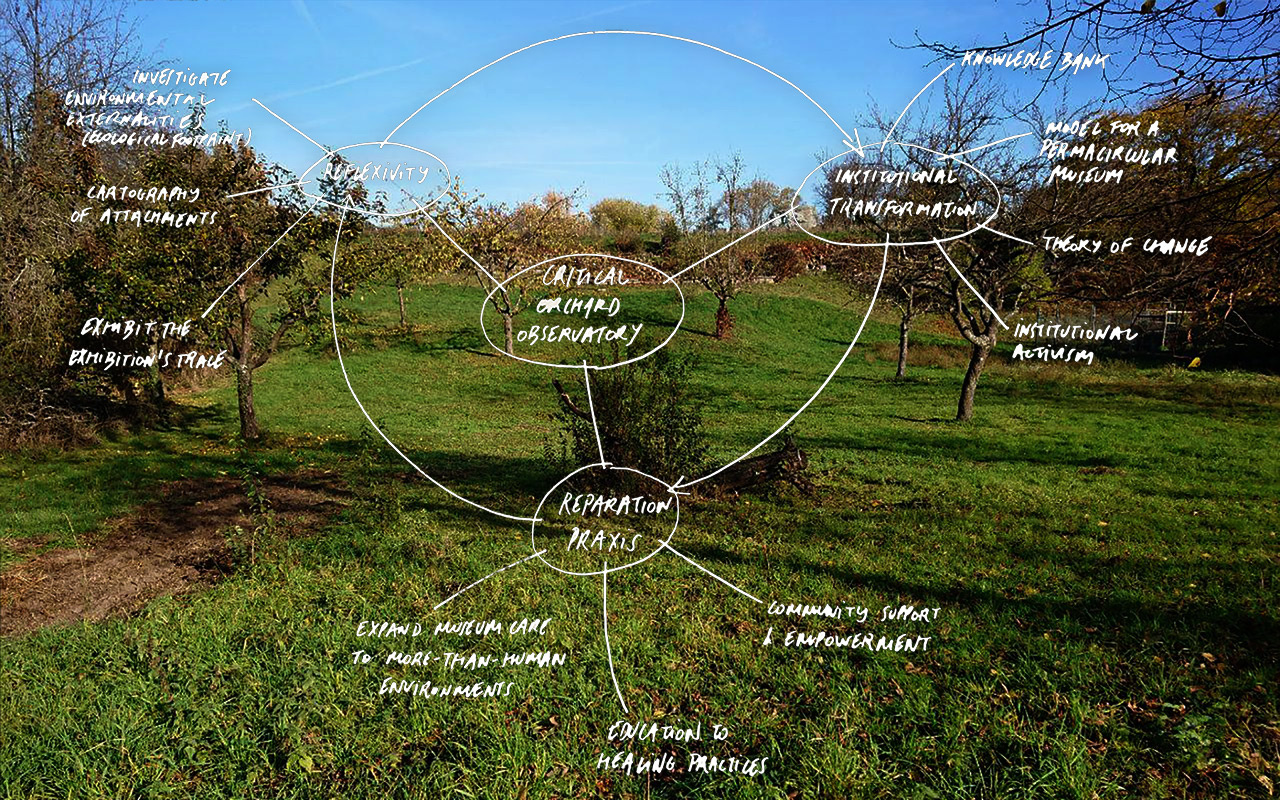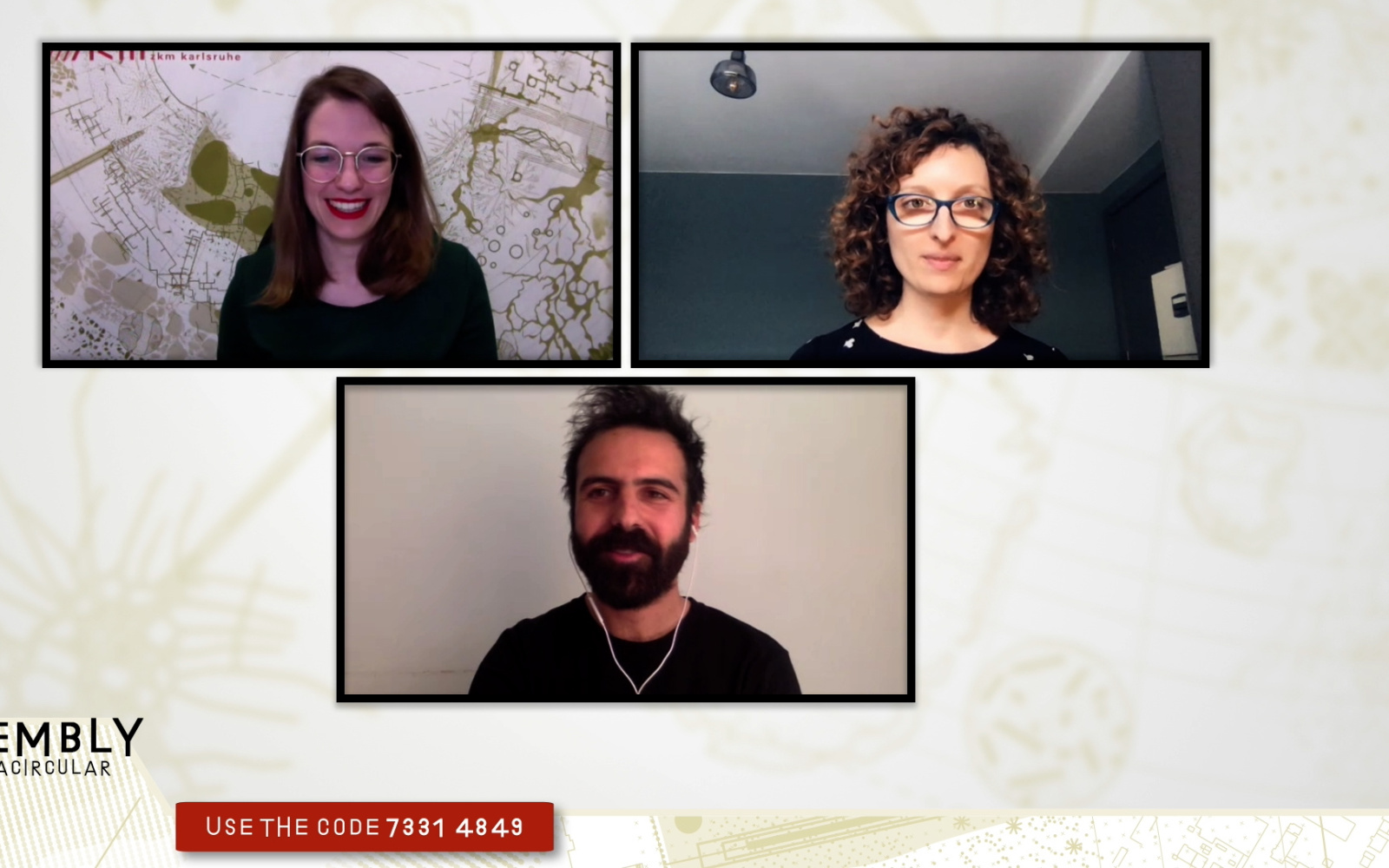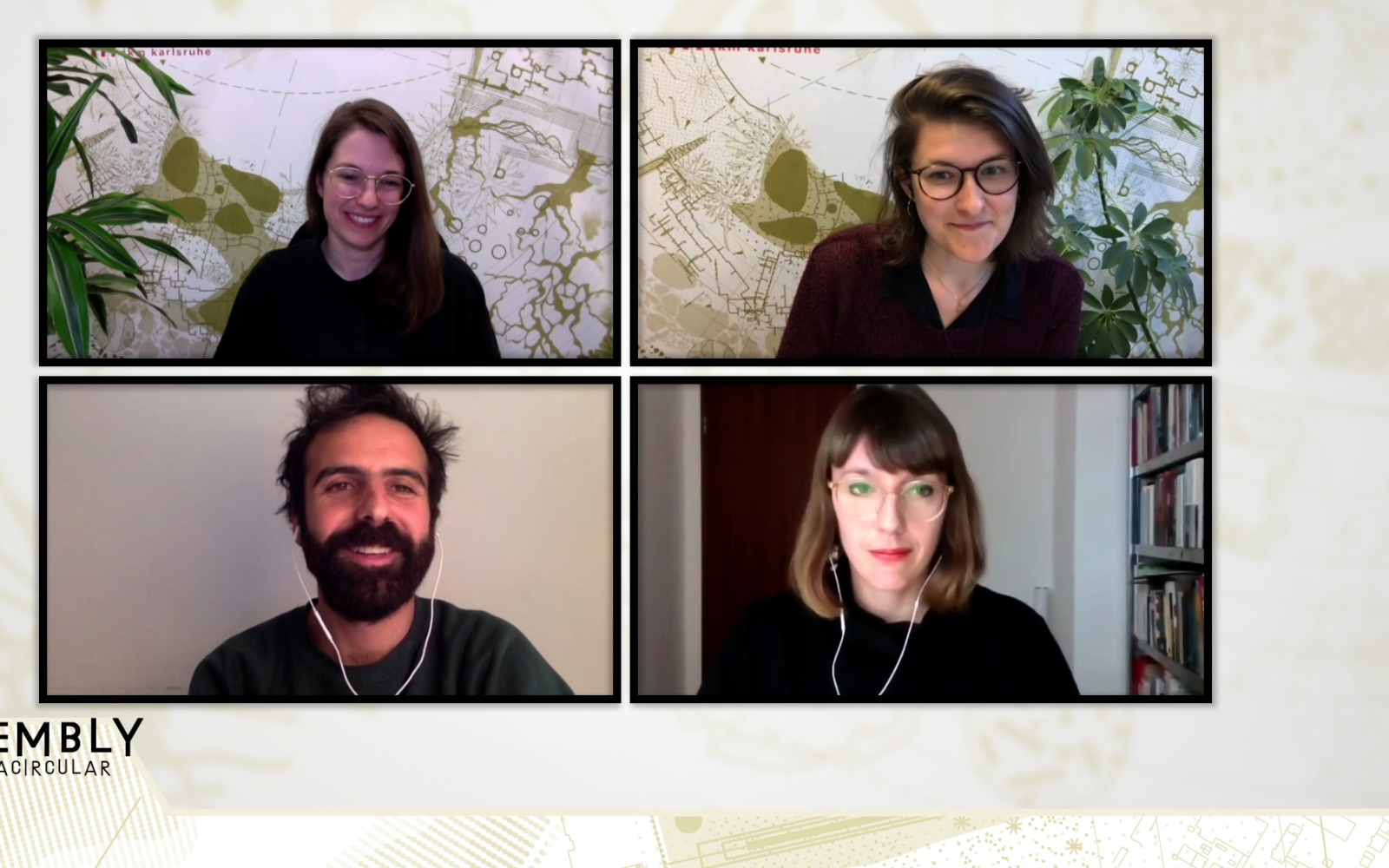- Event
Versammlung zu permazirkulären Museen
Exhibition-making, education, and care in times of ecological crisis
Wed, April 21 – Sat, April 24, 2021
- Location
- Online
- Language
- English
The cultural sector is giving more and more space to ecological as well as postcolonial discourses, but at the same time is itself caught up in capitalist entanglements. How can its institutions make the radical shift towards a permacircular future?
In recent years there have been numerous artistic and discursive contributions across museums, biennials, and institutions that all addressed the following question: How can art contribute to fostering solidarity, ecological becoming, and multispecies caring? The emergence of this »terrestrial turn« in cultural spheres has been, however, codependent on the globalization of the art industry and its reliance on abundant fossil energy, cheap flights, and material accumulation. Simultaneously, postcolonial debates have also gained visibility in cultural spaces historically established on colonial theft. How can institutions reflect their footprint and conditions of production despite being situated in a capitalist context? In other terms, can the institution be trusted to reinvent itself and, if so, what should a museum be?
In sustainable economics, »permacircularity« advocates resizing organizations in balance with Earth systems, while also retooling knowledge and practices towards planetary reparation. Taking as a point of departure the ecological blind spot of the exhibitionary complex, this assembly convenes institution leaders, curators, activists, artists, and educators to explore museums’ potential to become agents of radical mutation.
Over three days, the event brings together keynote addresses, case studies, roundtables, professional workshops, and artist performances to discuss the future of art institutions, share experiences, and explore alliances with radical and grassroots movements. The conference is initiated in the framework of the project »Notes towards a Permacircular Museum« by Stéphane Verlet-Bottéro for the exhibition »Critical Zones«. Following an exercise in mapping the show’s environmental footprint and a collective effort to restore an abandoned fruit orchard near ZKM, the project explores the possibility of expanding museum maintenance practices to more-than-human solidarity and sheltering.
The event will be in English.
Any questions or ideas? Feel free to drop us a line at hellocriticalzones@zkm.de
Program
Time zone: CEST, schedule subject to change.
The panels marked with an * will be held in closed Zoom discussions. For registration fill in the form below.
Wednesday, April 21
| 2 pm–3.30 pm | Opening remarks (To the livestream in English)
This introduction session will harvest a broad range of questions from the project initiators and guest lecturers, framing the following focus sessions. Institutions increasingly speak of giving nature a voice, and even rights. How are the ethics and practices of cultural institutions affected once we take this claim seriously? Which new visions do we need for art institutions in what Bruno Latour has called the New Climatic Regime, and how can we translate self-criticism into action?
with Lucia Pietroiusti (curator of General Ecology at Serpentine Gallery, London) and an activation by Mira Hirtz (performance artist and art mediator, Karlsruhe) | |
| 4 pm–6 pm | »Re-Imagining institutions« * – moderated by Lucia Pietroiusti (curator of General Ecology at Serpentine Gallery, London) An art institution is a place of encounter of subjectivities, of visibility, and world-making. Its main functions are based on conservation, accumulation, and energy-intensive practices. This roundtable considers the concept of the »art footprint« to deconstruct the museum’s foundation on practices inherited from ecocidal capitalism, such as temperature control, low-cost flights, and the white cube. In the spirit of Ivan Illich’s »Tools for Conviviality«, what strategies could lead to re-tooling institutions and empowering low carbon communities?
with Diane Drubay (Founder of We Are Museums, Berlin) Hicham Khalidi (director of Jan van Eyck Academie, Maastricht) farid rakun (member of ruangrupa, collective artistic director of documenta 15) Tino Sehgal (artist) and an activation by Mira Hirtz (performance artist and art mediator, Karlsruhe) |
Thursday, April 22
| 2 pm | »Horizons for our back (walking piece)« * – Performative walk with Astarti Athanasiadou (choreographer, performer, Amsterdam)
»Horizons for our back« is a movement based laboratory exploring inner somatic spaces that intersect with the external environment, as a process of embodying resilience. The body is conceived as an organic phenomenon; omni-centered, anti-hierarchic and acutely sensitive to external stimuli. The laboratory will offer an immersive experience around the question of how do we embody our stand to the unknown future and how do we relate to what we leave behind us.
Participants are encouraged to have a pen, paper, analogue watch and a small space to move and lie down. | |
| 4 pm–6 pm | »Mobility and art practices« * – moderated by Martin Guinard (co-curator of »Critical Zones. Observatories for Earthly Politics«)
Rising climate awareness as well as the pandemic are challenging global mobility in unprecedented ways. Place, space, and movement are being redefined. Édouard Glissant’s writings on the »Poetics of Relation« have introduced the radical difference between economic globalization and planetary globality. How can cultural institutions engage with these transformations, and reevaluate their relationship with both local contexts and the translocal circulation of ideas and forms? How to think beyond the dualist alternative between fossil-fueled hypermobility and the identity politics of re-rooting?
with Marco Baravalle (researcher and activist at IUAV and Sale Docks, Venice) Oliver Kandt (curator and director of Parallel Oaxaca, Oaxaca) and Edith Morales (artist, activist, Milpa Urbana, Oaxaca) Jakob Kudsk Steensen (artist, Berlin) Pia Lindman (artist, researcher of the subsensorial, and founding member of Solbacka ecovillage, Inkoo) and an activation by Benoît Verjat (research designer) | |
| 6.30 pm–8.30 pm | »Towards terrestrial practices in exhibition-making« * – moderated by Daria Mille (curator at ZKM | Center for Art and Media) and Matthias Gommel (artist and exhibition designer, Karlsruhe)
The ecological footprint of art institutions can be reduced through a more responsible approach towards exhibition-making. This session will focus on sharing exhibition-making practices that follow a more sustainable way of production, thus highlighting the importance of taking responsibility for the environmental impact of institutions’ own action. This section will present case studies by experts in the field who practice these approaches but will also address obstacles to the process of ecologizing art museums. The event opens a space for discussion, exchange, and sharing between professionals in the art sector, also involving learning from experience of other types of museum institutions.
with Ianina Prudenko and Alexei Shulgin (co-founders of »Art Footprint Manifesto«) Graciela Melitsko Thornton (Creative Green Programme Lead, Julie’s Bicycle, London) Andrea Trimarchi and Simone Farresin (design studio Formafantasma, Amsterdam) Helen Turner and Pablo Wendel (Co-Artistic Directors, E-WERK Luckenwalde) and an activation by Benoît Verjat (research designer) |
Friday, April 23
| 2 pm–4 pm | »Museum as shelter« * – moderated by Stéphane Verlet-Bottéro (artist, ecologist, curator)
Inspired by the ongoing debate on the restitution of plundered objects held by Western museums, we can interrogate the role of cultural institutions in planetary repairing. The acceleration of global extinctions leads us to consider institutions’ conservation work with a new look. Could care and maintenance knowledge be expanded to more-than-human collectives? In times characterized by the disappearance of refuges, how might cultural spaces contribute to restoring, regenerating, and protecting life?
with Amal Khalaf (director of programmes at Cubitt, London) Klass Kuitenbrouwer (curator, researcher, Zoöp co-initiator at Het Nieuwe Instituut, Rotterdam) Sonia Lawson (director of Palais de Lomé) Nataša Petrešin-Bachelez (curator, Head of Public Programme at Cité internationale des arts, co-founder of Initiative for Practices and Visions of Radical Care, Paris) Ela Spalding (artist~facilitator along art and ecology, Estudio Nuboso) and an activation by Alecia Neo (artist, Singapore) | |
| 5 pm–7 pm | »Observatories for earthly education« * – moderated by Barbara Zoé Kiolbassa (art educator at ZKM | Center for Art and Media) and Alessandra Pomarico (curator, writer, educator, founder of Free Home University, editor at www.artseverywhere.ca)
Earthly politics require an earthly education, also articulated through reimagined cultural institutions. What does an eco-centered, terrestrial education approach look like in practice? From what and from whom should we learn? What must we unlearn? And how could art education support a reweaving of relations, for us to think with, for and through the more-than-human? Together with educators, artists, curators, and other learners, we will explore possibilities to aligne education with multispecies worlding, and consider how regenerative pedagogies could significantly change cultural institutions in their role and impact. Education, here, is understood politically, and as a fundamental practice of care.
with Dr. Cara Courage (head of Tate Exchange) Ph.D. Kū Kahakalau (indigenous educator, CEO EA Ecoversity, Hilo, Hawaiʻi Island (Occupied Territory)) Marion Louisgrand-Sylla (co-founder of Kër Thiossane, Dakar) Rosario Talevi and Sarah Bovelett (Floating University, Berlin) and an activation by Alecia Neo (artist, Singapore) | |
| 7.30 pm–8.15 pm | (Un)Closing remarks (To the livestream in English)
Prospects for permacircular museums with »Sonosfera«, a piece by Jorge Bejarano Barco |
Saturday, April 24
| 4.30 pm–5.30 pm | Kitchen_Ferm_Lab - digital – Special edition: Vegan Honey Booked out The »Kitchen_Ferm_Lab« deals with the refinement of food and the cultivation of algae, fungi, bacteria and their symbioses. Where do the lactic acid bacteria come from? What environment is necessary for reproduction? What is a Scoby? How is wild yeast produced? Is there magic mold? In this workshop, which is offered in digital form, we will ferment and experiment together. In this session, we will explore the wonders of vegan honey making.
with Fanny Kranz (Designer and Art Educator) Max Kosoric (Designer and Art Educator) Karl Michael Drohsel (Produktkollektiv Vienna)
This workshop is booked out. |
The panels marked with an * will be held in closed Zoom discussions. For registration fill in the form below.


